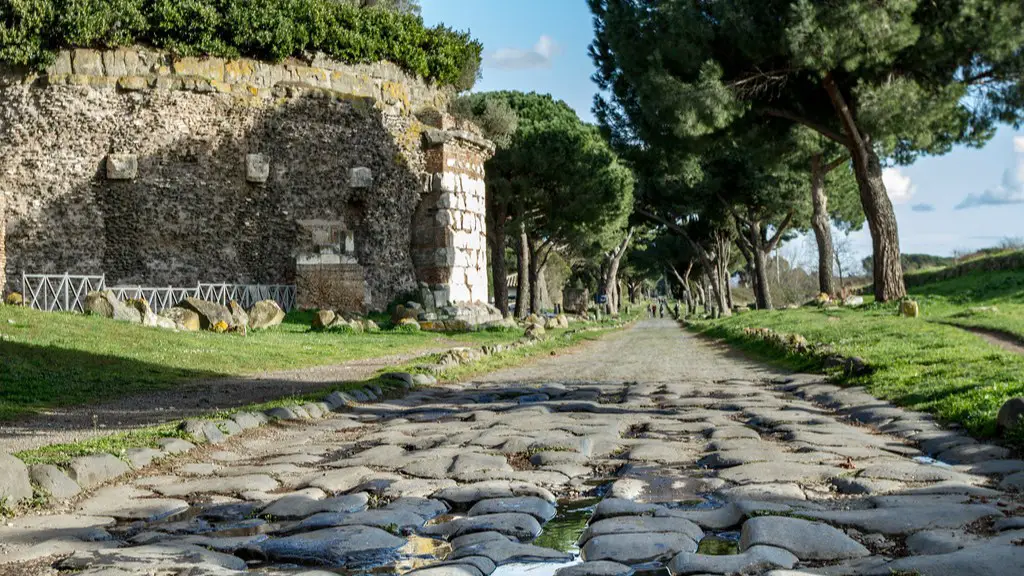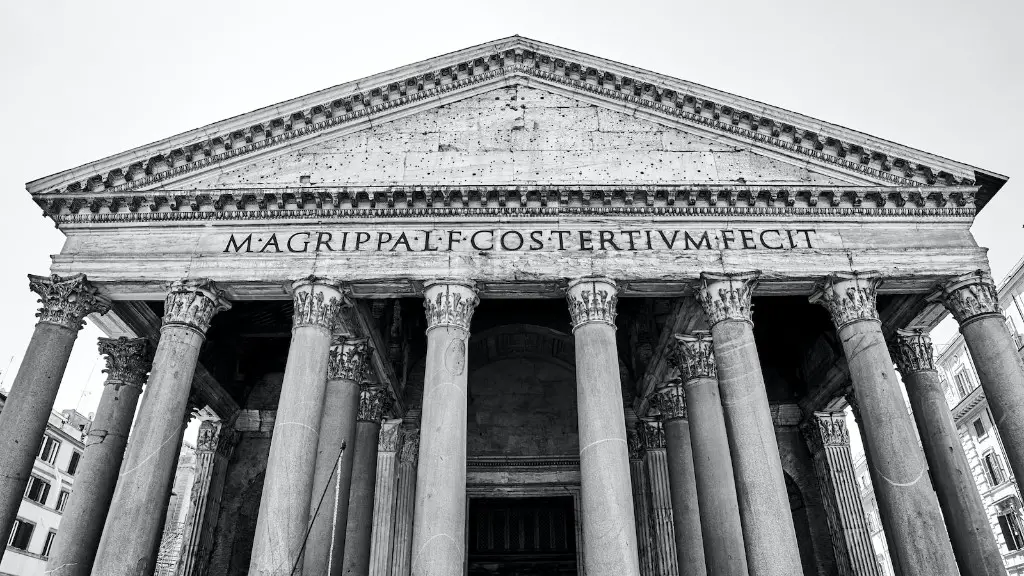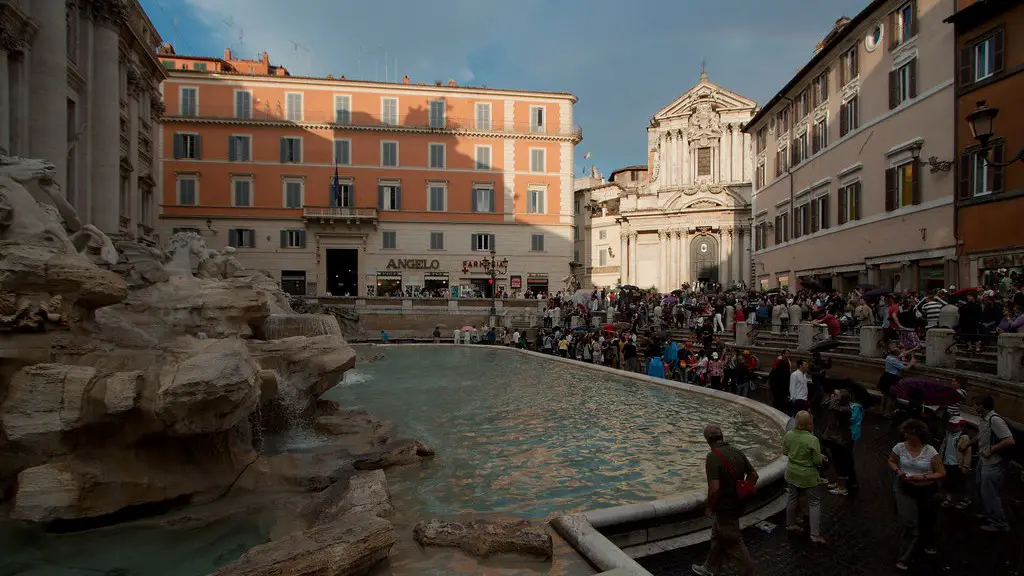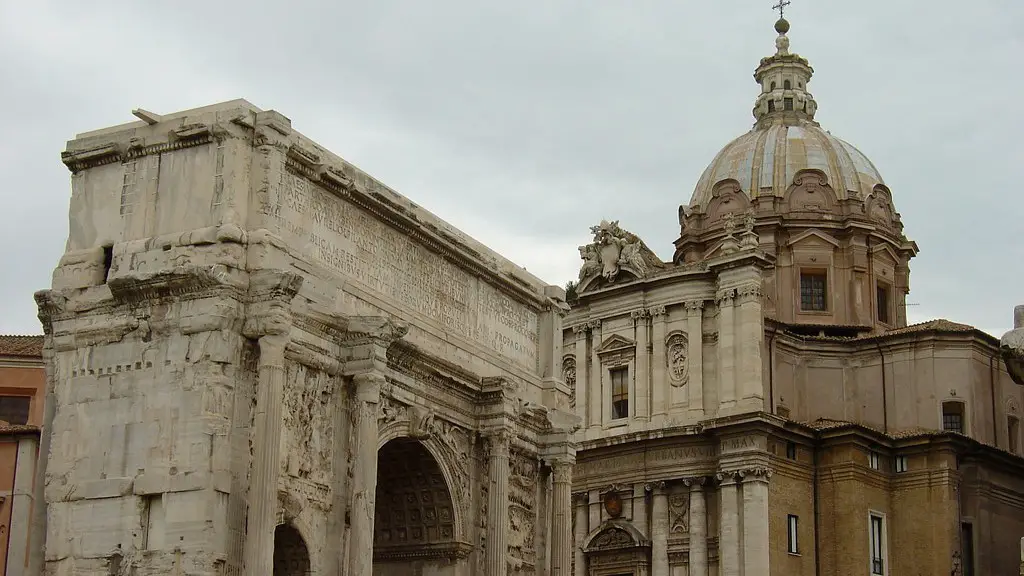Why Did Ancient Romans Speak Greek?
One of the lasting legacies of ancient Rome is the immense influence it had on the world. It is not surprising to learn that the language of the Romans, latin, made its way into history books and became a core language of many countries around the world. What was unusual, however, was the fact that a great many ancient Romans also spoke Greek, an entirely different language. This most unusual phenomenon has intrigued historians, linguists, and ancient language enthusiasts for centuries.
Evidence indicated the two languages co-existed in ancient Roman civilization. Latin was considered the official language, used mostly in government, politics and law. On the other hand, Greek was commonly used in daily life and by educated people. In fact, one of the most common details in inscriptions from ancient Roman times is the usage of Greek words to describe everyday items, such as tools, food items, and clothes. This includes descriptions of peoples’ occupations, which are often written in Greek. Furthermore, Latin and Greek words were often intermingled in the same document.
One theory proposed is that ancient Romans spoke Greek because of the country’s location. Rome was situated among the Greek speaking lands of the eastern Mediterranean and interacted regularly with them commercially and militarily. Many Greek speaking individuals and groups settled in Rome and influenced the everyday language of the people living in the city. In fact, after the fall of the Roman empire most of the Latin speaking inhabitants of the city shifted to Greek as the language of commerce.
Another possible explanation is that the two languages fed into each other in terms of words, concepts, and script. It is important to note that both Latin and Greek, despite being different languages, are part of the Indo-European language family. In the past, many attempts have been made to show how words and concepts were shared between the two languages. For example, the Latin word “competition” has a similar form in Greek; a similar relation can be observed for many other words. This suggests ancient Roman scholars and teachers were likely responsible for the borrowing of Greek words and grammar into Latin, as part of their daily life and education.
Overall, the idea of ancient Rome speaking Greek can be seen as part of the evolution of language and culture in the classical age. Latin was undoubtedly the main source of communication during this period, however, many features of the ancient Roman civilization, such as literature, philosophy, and religion, were heavily influenced by Greek culture and language. As the Roman sphere of influence expanded, Latin was spread alongside Greek, with the recipe for its success being the embrace of two natural and mutually compatible forces.
The Influence of Greek Literature on Ancient Roman Culture
The influence of Greek literature on the ancient Roman culture was highly significant as it had an effect on Roman literature and art, and gave the Romans a sense of identity and pride. Greek literature provided Roman writers with a range of subjects such as philosophy, mathematics, and history to draw upon. Roman writers such as Virgil and Ovid used themes from Greek literature in their works and also modified some of the ideas to incorporate Roman concepts.
The Romans were particularly influenced by the works of Homer which comprised of two major Greek epics: the Iliad and the Odyssey. The heroes of these tales of war and adventure were a source of inspiration for many later Roman authors. In the Iliad, the story of the Trojan War, the characters of Achilles and Hector served as role models to the Roman soldiers who valued honor and courage.
The poems of Hesiod, another important Greek poet, were a major source of inspiration for Roman writers as well. The Theogony and the Works and Days were two of Hesiod’s writings that explore the creation of the world, the origin of the gods, and the attributes of justice, labor, and justice. Hesiod’s ideas on piety and morality were copied by some Roman authors.
Greek philosophy also had a large influence on the Roman culture. The writings of Plato, Aristotle, and the Stoics were studied by Roman scholars and philosophers. Notable figures like Cicero and Seneca were familiar with the works of these Greek philosophers and used them to develop their own ideas.
Overall, it can be said that the influence of Greek literature on the Roman culture was extensive. Roman writers, politicians, and philosophers were inspired by the works of the Greeks and used their ideas to develop a more distinct Roman culture.
The Role of Greek in Ancient Roman Politics
Greek had an important role in the political environment of the Roman Republic and Empire. The ruling classes of Rome were familiar with Greek language and literature as well as philosophy and political science, which were vital skills to them as they ran the state. Greek was utilized on a range of communications, from architecture and statues to documents and decrees.
Many of Rome’s laws and political processes were inspired by the democratic system of the Greeks. This included the use of senate assemblies, tribunals, and the concept of representation of the people by elected officials. The Romans also adopted Greek terms such as ‘boule’ for their elected council and ‘gerousia’ for their senate.
The Roman Empire also borrowed from Greek culture and literature to legitimize its rule. The words and symbols of the Greek gods were incorporated in Roman imperial symbols to establish the Emperor’s power over the state. The ritual of the ‘Triumph’ procession was developed from a similar Greek ritual, which was used to celebrate the Empire’s greatest victories. The Emperor’s palace was also designed in a similar style to the Greek palaces, specifically the Palace of Knossos in Crete.
In conclusion, Greek language and literature played a significant role in the ancient Roman politics. The Romans utilized the ideas of the Greek democratic system to establish their own political institutions and ceremonies. Greek language and culture were also used to legitimize the rule of the Roman Emperors.
The Spread of the Greek Language to the Roman Empire
The spread of the Greek language to the Roman Empire had a dramatic impact on the culture and politics of the Roman world. It was due to the rise of Alexander the Great and the expansion of the Hellenistic civilization from Greece to the Middle East, North Africa, and Europe.
Greek culture and language spread to the Eastern Mediterranean and the Near East, which were under the direct influence of the Hellenistic civilization, thanks to the establishment of Greek colonies and empires. As a result, Greek became a commonly spoken language in these regions and eventually gained official status in Roman provinces.
The spread of Greek was also facilitated by the establishment of libraries and schools in the colonies and newly established Greek cities. These institutions taught the Greek language, literature and philosophy, and formed a large Greek educated class in the Roman world.
In conclusion, the spread of the Greek language to the Roman Empire had a profound effect on Roman politics, culture and society. The establishment of Hellenistic colonies and cities allowed the language to spread to new regions and lead to an increase in education and literacy in the Greek language.
Political Relationships between Greek and Roman Empires
The political relationship between the Greek and Roman Empires in the ancient world was complex. While the two empires interacted in various ways, they also displayed a certain level of competition. This was due to Rome’s widespread territorial ambitions and its desire to expand its control while the Greeks were more focused on preserving the unity of their cities and states.
Rome and Greece were often at odds with each other politically, due to Rome’s imperialist ambitions. The Greek cities remained fiercely independent despite Roman attempts to control them, resulting in several wars between the two powers. The Romans eventually managed to establish control over the Greek cities after several decades of conflict.
Although the two empires were often at odds with each other, they also interacted in various ways. Greek culture and literature had an influence on Roman culture, politics, and literature. The Roman Empire also adopted various features of the Hellenistic world, such as the use of Greek language for official documents and the adoption of the Greek gods into their pantheon.
In conclusion, the political relationship between the Greek and Roman Empires in the ancient world was complex. The two powers were often in competition but also interacted in various ways, with the Romans introducing Greek culture and literature into their society.
The Impact of the Greek Language on the Roman Empire
The impact of the Greek language on the Roman Empire was considerable. Greek was the language of trade, communication, and literature throughout the Mediterranean, and after the fall of the Greek Empire it became a lingua franca of the Roman world.
Greek was also the language of literature, science, and philosophy in the Roman Empire. Greek writers, scientists, and philosophers had a major influence on Roman culture, and their works were studied by Roman scholars. The works of the Greek authors such as Homer, Hesiod, and Plato were used by later Roman authors for inspiration.
The introduction of Greek language and culture into the Roman Empire also had a political dimension. Greek was the language of choice for the ruling classes of Rome, who used it for communication, diplomacy, and official documents. This ensured that the influence of Greek remained important in the Roman Empire.
In conclusion, the impact of Greek language on the Roman Empire was extensive. Greek was the language of trade and communication throughout the Mediterranean, and the language of literature and science in the Roman world. Furthermore, its use in diplomacy and official documents ensured a lasting presence of the Greek language in Roman society.





